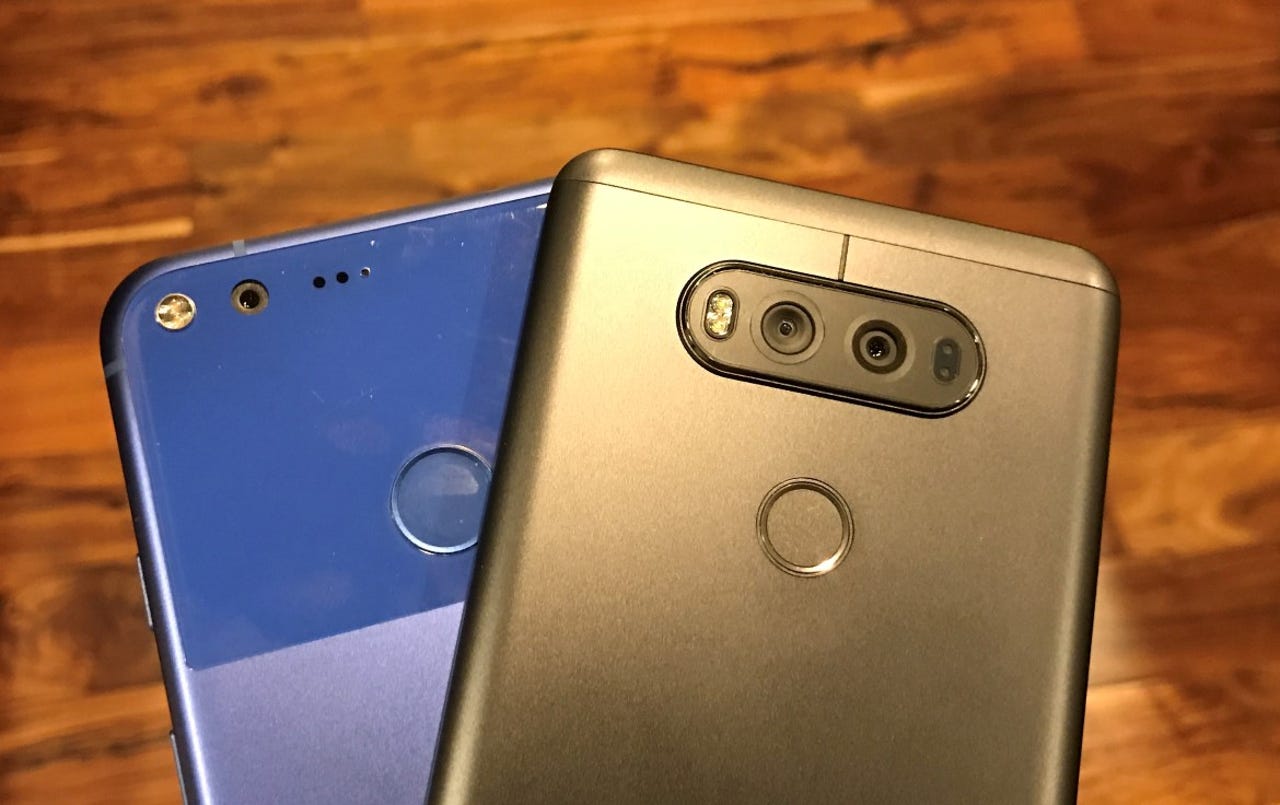Android Nougat experiences: Time with Google Pixel XL reveals LG V20 may be greater than you think


While some phones are starting to see software updates to Android 7.0 Nougat, two phones recently launched with Nougat out of the box, and I've been using both of them.
The LG V20 claim to fame was that it was the first to launch with Nougat, while the Google Pixel XL also launched with Nougat and then quickly updated to Android 7.1 with the latest monthly Android security updates.
It took me a couple of months to finally purchase my own Google Pixel XL so I could try out the newest Google phone with the latest Android software. It is a fantastic device, and I am very pleased with everything, except for the high price and limited internal storage of the 32GB model I purchased.
The LG V20 has been with me for a couple of months, and in typical LG fashion, it is a phone that gets better the more that you use it. Spending the last week with the Google Pixel XL and LG V20 side by side has convinced me the LG V20 may be the most underrated phone of 2016.
As you consider the Google Pixel XL or the LG V20, here are some of my experiences with both devices, which may help you focus in on one of these two Android Nougat-powered smartphones.
Why choose the Google Pixel XL?
The Google Pixel XL continues to be rather difficult to purchase, with limited availability on the Google Store. I purchased a used one from Swappa and am satisfied with the purchase. Here are a few reasons that readers may want to choose the Google Pixel XL over the LG V20:
- Software: The primary reason to purchase a Pixel phone is to make sure your phone receives the latest and greatest version of Android before anyone else. You also get the monthly Android security updates, and that means a lot for those looking for the most secure Android phone.
- Google Assistant: One function in Nougat that may stay exclusive to the Pixel is Google Assistant. You can experience this service in the Google Allo app on other devices, but it is integrated on the Pixel. Hands-free assistants can be very helpful, and Google's may just be the best.
- Performance and latest Snapdragon processor: I'm not sure how much speed you gain with the Snapdragon 821 over the 820, but the Google Pixel XL flies. The LG V20 is fast, but the Pixel just seems to move a bit faster with everything. Having the latest processor also helps future-proof your device for at least the next couple of years.
- Google Daydream View: Virtual reality-powered by phones are still developing, but Google's implementation with the Daydream View (check out the ZDNet review) is the best so far. It is easier to use than the Samsung Gear VR and more comfortable. Unfortunately, LG doesn't currently support Daydream on the V20 -- and with its own solution, it's unlikely to provide this support.
- Larger capacity battery: While the LG V20 has a removable battery, which is very important to some people, the Google Pixel XL battery is 250mAh larger. Like my Apple iPhone 7 Plus, I can easily go a full standard day with the Pixel XL and never worry about my battery life. This is rare for me on an Android phone, and so far I couldn't be happier with the battery life.
Why choose the LG V20 over the Google Pixel XL?
The LG V20 is now available from all carriers and reportedly has sold twice as many units as the V10 so far. There are no issues with availability, so you can go and pick up a LG V20 now. Here's a few reasons you may want to do that:
- Larger display: The LG V20 has a 5.7-inch display, while the Google Pixel XL has a 5.5-inch screen. It's not a massive difference, but the screen-to-body ratio is greater, and it's nice to have a big screen for work.
- Second display: The improved secondary display above the main display makes use of the dead space normally appearing in the top bezel of a phone. While the utility of such a display is a personal preference, I use it every day and find it to be quite useful for quickly contacting family, launching apps, and responding to calls.
- Full-featured camera software: Google's camera software is very basic, and for the majority of people, it gets the job done. LG has advanced software, including manual photo and video modes, to give you complete control over the camera experience. There are some other modes in addition to fine controls that photographers will love.
- Inexpensive expandable storage: There is an ample 64GB of internal storage provided on the LG V20, but the device also has microSD expansion card support for a very inexpensive way to quickly and easily expand your storage capacity.
- Unparalleled video capture experience: If you plan to use your smartphone to capture video content, then you won't find a better video recorder than the LG V20. It has multiple microphones and manual, directional control of those mics with the advanced camera software.
- Advanced audio experience: The LG V20 comes with an integrated quad-DAC, so the headphone experience -- through a standard 3.5mm headphone jack -- is awesome. Even without having high-quality audio files, music sounds better on the LG V20 with a good set of earphones and the DAC enabled.
LG V20 review: in pictures
The LG V20 also has a second rear camera for wide-angle shots, but I didn't put that on the list since I don't find that much utility from it and have not been that pleased with the slight fish-eye look to the photos.
I also did not include the excellent tap-to-wake feature on the LG V20 since that has been confirmed as coming soon in an update for the Google Pixel. It's an advantage now, but not one that will set the LG V20 apart for much longer.
Another benefit of using the LG V20 is that when you use it with a new Samsung Gear S3 smartwatch, Samsung Pay works via the LG V20. In the past, you always needed a Samsung phone to use Samsung Pay, so it's great to get the NFC and MST payment systems support on a watch with the LG V20. Samsung Pay currently does not work with the Google Pixel phones.
Both are fantastic devices, but I'm leaning toward the LG V20 as my personal preferred phone. Which do you prefer and why?